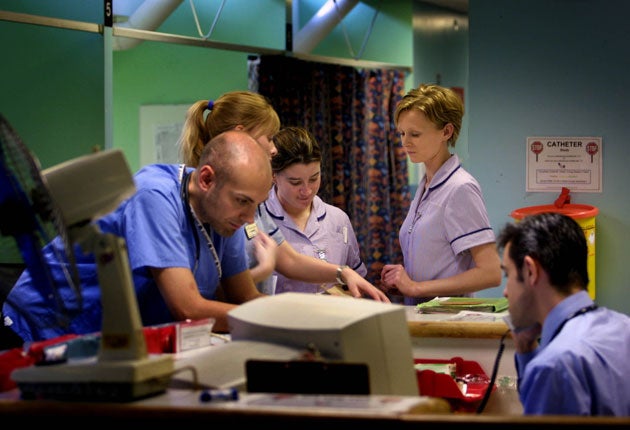Soaring hospital admissions seen as threat to 'overheating' NHS

The NHS is in danger of "overheating" as a result of a huge rise in the number of people admitted to hospital as emergencies, a health think tank warns.
Doctors are admitting people with less severe conditions than in the past, suggesting a switch to more defensive medicine, with more than one million extra patients coming into hospital over the past five years. Left unchecked, the trend threatens to bankrupt the NHS, the report by the Nuffield Trust says.
Emergency admissions account for more than a third of all patients in hospital and cost about £11bn a year. They have been rising for decades but have soared by almost 12 per cent since 2005, costing an extra £330m a year.
Jennifer Dixon, director of the Nuffield Trust, said: "Our hospitals are over-heating and are on an unsustainable path in which they are treating patients at great cost to the NHS and to patients themselves. Avoidable emergency admissions will continue to rise unless care is more integrated and hospitals and beds are closed. Otherwise, the risk is that the NHS becomes unaffordable."
The rise is linked to a dramatic increase in short-stay admissions. In England, almost 600,000 more patients were admitted for one day or less in 2008-9 than were five years earlier.
The report says this has followed from a lowering of the "clinical threshold" for emergency admissions. Advances in medical care have reduced the length of time patients remain in hospital and freed up beds, allowing doctors to admit more patients. But the effect has been patchy: some hospitals have doubled their emergency admissions and others have cut them by a third.
Despite the overall rise, people do not appear to be more unhealthy. When all the factors are taken together, the rise gives the appearance of greater efficiency, with more admissions, more discharges and shorter lengths of stay. Instead, it has "probably led to more 'inefficiency', a greater number of avoidable emergency admissions," it concludes.
The analysis was rejected by the College of Emergency Medicine. It said many emergency patients had symptoms such as chest pain or shortness of breath which could indicate severe illness and required tests and a period of observation to ensure it was safe to discharge them home.
John Heyworth, thepresident and a consultant in A&E medicine at Southampton, said: "It is fundamentally incorrect to assume that admissions for less than 24 hours are unnecessary or financially inefficient. In fact, the opposite applies: a properly staffed emergency department represents a highly cost-efficient system with optimal use of diagnostics and informed decision making ensuring high-quality, safe care."
Reasons why
*Increased illness and frailty linked to an ageing population
*Increased public expectations leading to more self-referral to NHS care
*Incentives such as central targets and new ways of paying hospitals
*Lowering of clinical threshold and more "defensive" medicine
*Increased ability to detect and treat illness
*Changes in care outside hospital such as general practice
... and what should be done to curb the rise
*Reform the system for reimbursing hospitals to discourage avoidable admissions
*Improve links between hospital care and GPs, community services and social care
*Introduce financial incentives for keeping people well
*Reduce the number of hospital beds in line with the trend to shorter admissions
*Identifiy patients at high risk of being admitted in the future to target support
*Learn from NHS trusts where emergency admissions have declined.
Subscribe to Independent Premium to bookmark this article
Want to bookmark your favourite articles and stories to read or reference later? Start your Independent Premium subscription today.

Join our commenting forum
Join thought-provoking conversations, follow other Independent readers and see their replies